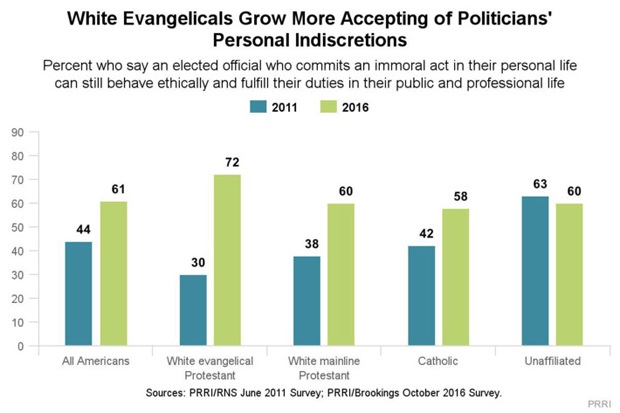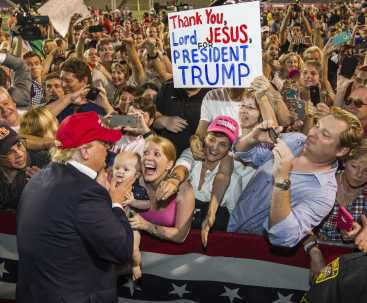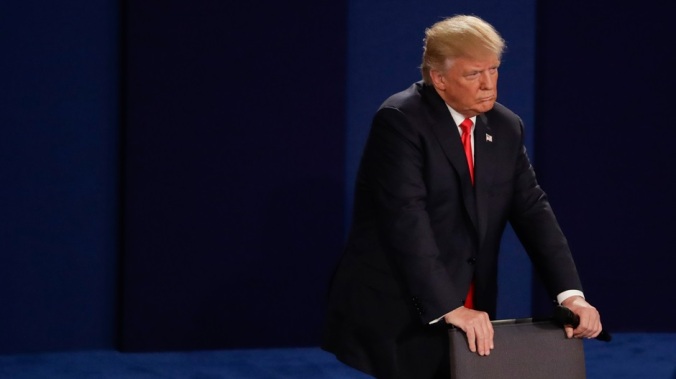This should be my last post on this tragic election cycle. I am definitely ready to focus on other subjects! But a report has been released that I find profoundly disappointing and disturbing, though not that surprising. People were asked whether an elected official who commits an immoral act in their personal life can still behave ethically and fulfill their duties in their public and professional life. This survey was conducted in June of 2011 and again last month. Here are some of the results:
 As you can see the biggest change—by far—was in the responses of white evangelical Christians. In 2011, only 30% of white evangelicals agreed that an elected official could commit an immoral act in private but still behave ethically and faithfully fulfill their duties. In 2016, that percentage flip-flopped by 42%, going from 30% to 72% in five years. We went from being the demographic with the fewest yes answers to this question to the one with the most (even more than Democrats, who were at 61% yes answers).
As you can see the biggest change—by far—was in the responses of white evangelical Christians. In 2011, only 30% of white evangelicals agreed that an elected official could commit an immoral act in private but still behave ethically and faithfully fulfill their duties. In 2016, that percentage flip-flopped by 42%, going from 30% to 72% in five years. We went from being the demographic with the fewest yes answers to this question to the one with the most (even more than Democrats, who were at 61% yes answers).
As you might have guessed, the media are widely reporting that the moral character of political candidates is no longer an issue for white evangelical voters. And one would be hard pressed to fault them for observing this. What caused such a dramatic change in evangelical convictions this year? Donald Trump.
In 1998, it was revealed that Bill Clinton had been conducting an adulterous affair (amid widespread allegations of many more). Conservative evangelicals were virtually unanimous in their condemnations of these actions. A common refrain at the time was: “If he’ll cheat on his wife, he’ll cheat on the country.” In September of 1998, prominent evangelical leader James Dobson wrote a letter publicly expressing his concern for our nation. Here are some excerpts:
“As it turns out, character DOES matter. . . . How foolish to believe that a person who lacks honesty and moral integrity is qualified to lead a nation and the world! Nevertheless, our people continue to say that the President is doing a good job even if they don’t respect him personally. Those two positions are fundamentally incompatible. . . .
“I just don’t understand it. Why aren’t parents more concerned about what their children are hearing about the President’s behavior? Are moms and dads not embarrassed by what is occurring? At any given time, 40 percent of the nation’s children list the President of the United States as the person they most admire. What are they learning from Mr. Clinton? What have we taught our boys about respecting women? What have our little girls learned about men? . . .
“I am left to conclude from these opinions that our greatest problem is not in the Oval Office. It is with the people of this land! We have lost our ability to discern the difference between right and wrong. . . . We are facing a profound moral crisis — not only because one man has disgraced us — but because our people no longer recognize the nature of evil. And when a nation reaches that state of depravity — judgment is a certainty.”
James Dobson
September, 1998
Stirring words, aren’t they? Many of Bill Clinton’s defenders tried to downplay his moral problems by insisting we are “electing not clergy but political leaders.” Dobson quoted them in his letter, and made very clear he didn’t buy this defense. Now compare Dobson’s strong moral stance then to what he says about Donald Trump now:
“I don’t vote for candidates . . . Policy is what matters. . . .
“His rhetoric has been inexcusable, and I don’t defend it. . . . There are obviously characteristics of Trump that I wish I could change. However, I believe he is the best candidate available, period. . . .
“I’m not under any illusions that he is an outstanding moral example . . . It’s a cliché but true: We are electing a commander-in-chief, not a theologian-in-chief.”
James Dobson
September, 2016
Since the tape was revealed—with Donald Trump grotesquely boasting of sexually assaulting women—Dobson has affirmed his endorsement of Trump. But is he the only one who’s relinquished their previous standards?
Pat Robertson condemned Bill Clinton as being “debauched, debased and defamed,” said that resignation would be too easy for him and that, “We need to prove to the American people that our elected officials have the courage and the love of country to do what is right for America [referring to impeaching Clinton].” And what does he say of Donald Trump? Three days ago Robertson told Trump, “You inspire us all.”
Ralph Reed and Gary Bauer both led the charge against Bill Clinton because of his lack of character. Both are now publicly supporting Donald Trump. They, and many other evangelical leaders, made strong statements opposing Bill Clinton because of his lack of moral character. So it’s fairly easy to compile a list contrasting many of these evangelical leaders’ opposition to Bill Clinton because of his character with their current support of Donald Trump despite his character, often using the very same arguments used by Bill Clinton’s defenders. (The press has already published a few such comparisons, and you can be assured more are on the way.)
Of course, a great many evangelical leaders are refusing to change their views:
“If I were to support, much less endorse, Donald Trump for president, I would actually have to go back and apologize to former President Bill Clinton.”
Al Mohler
June, 2016
But, in their support of Trump, many others have gone from saying ‘yes, poor character disqualifies a person from elected office’ to saying ‘no, it does not.’ Ed Stetzer clearly diagnoses this problem:
“That’s the definition of selling out.”
 But, why?
But, why?
Many evangelical Christians see this current race as a “must-win” election . . . and that’s a problem. Because—as those who have placed our faith and trust in the hope of the world, Jesus Christ—there is no must-win election. The only must-win battle has already been won. Victory is assured. Christ will enact the victory when he returns. And let’s remember just what this victory entails. This victory isn’t merely about going to heaven or hell; no, this victory is the answer to everything wrong with our society now. Christ’s victory is the answer to injustice and corruption and immorality and fear. It’s the only real answer, the only real victory. That’s why it’s good news.
Does this mean we shouldn’t try to make things better in this life? Of course not. We’re to be salt and light. We should seek to make positive change wherever we have opportunity. But we must never expect that we are the ones who will make everything right. And we shouldn’t presume that God intends to win the victory now through us. We are to faithfully shine the light in the darkness, but we are not the ones who conquer the darkness. That is neither our responsibility nor our role.
God has placed us behind enemy lines. We are in the world. And don’t forget the United States is not a part of the kingdom of God; it’s a part of the world. There will be times when we’ll have a positive influence for good in our nation, and that’s a cause for rejoicing. But we shouldn’t be surprised or disheartened if the darkness is sometimes resurgent. It’s not our job to defeat the darkness, but to shine the light within it.
Could God put a stop to abortion immediately?
Could God put a stop to abortion immediately? Of course he could. Just as he could immediately stop all injustice, all corruption, all pain and suffering. Why doesn’t he? The extremely short answer is that he has a plan. His plan leads to victory over all evil. But at this time he allows the world the freedom to destroy themselves. This can be almost unbearably ugly and heartbreaking. So we do what we can to influence our society for good, but we realize these micro-victories are fleeting and easily undone. We know our victory will not be won now. Even in our sorrow for our society and for those who are horribly mistreated, we are not distraught or despairing. We don’t act out of frenzied desperation. Because our hope is not a temporary, heavily-contested victory now. Our hope is not in the latest “must-win” election. No, our hope is in God, in his plan, and in his victory.
We don’t have to win now.
But we do have to be faithful now, to remain who we are, to remain salt and light . . . to remain true to our convictions.
We must never sacrifice our convictions.
Not for anyone.

 Two days ago, I posted a link to a recent Christianity Today editorial (
Two days ago, I posted a link to a recent Christianity Today editorial (